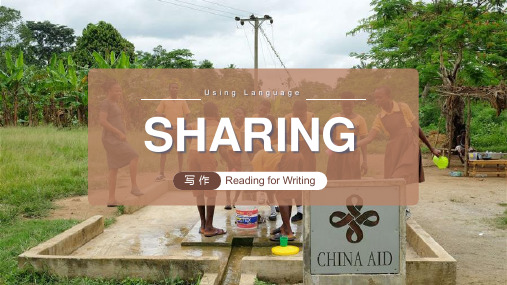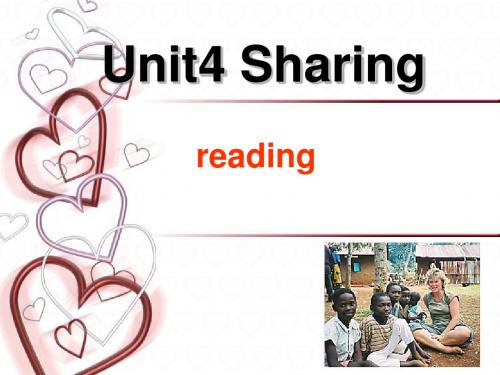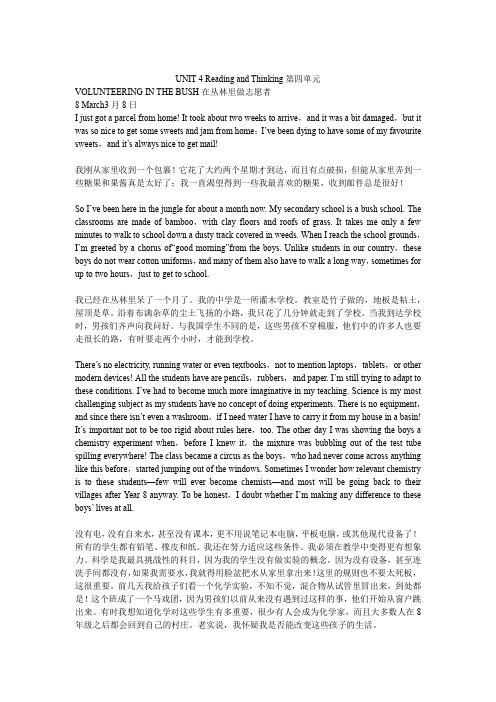Unit 4 sharing (reading)
新教材人教版高中英语选择性必修第四册Unit4 Sharing单词短语句型写作汇总

Unit 4SharingReading and Thinking ...................................................................................................... - 1 -Learning About Language ................................................................................................ - 5 -Using Language ............................................................................................................... - 7 -Reading and Thinking要点精研*Unlike students in our country, these boys do not wear cotton uniforms.不像我们国家的学生那样, 这里的孩子们不穿棉质校服。
*(2019·浙江高考)School uniforms are traditional in Britain, but some schools are starting to get rid of them.在英国穿校服是个传统, 但是有些学校正开始摆脱它们。
*For twenty minutes or so, our train seems to travel at a uniform speed.大约二十分钟的时间里, 我们的火车似乎在匀速行驶。
【语块积累】in uniform 穿制服school uniform 校服uniform speed 匀速; 等速uniform customs 统一惯例*There is no electricity, running water or even textbooks, not to mention laptops, tablets, or other modern devices.那儿没有电, 没有自来水, 甚至没有课本, 更别提笔记本电脑、平板电脑或者别的现代化设备。
Unit4+Sharing+reading+for+writing+人教版2019选择性必修第四册

Thank you!
While-writing
Summarize the structure of the speech
Beginning
Greeting self-introduction Express the honor Rhetorical question
leisure time together, and except for school and work, we were never apart. So I was unhappy about her leaving without even asking for my input.
Content of the speech Theme of the speech
Rhetorical question
While-writing
The structure of the speech
Topic of the speech
I had the same questions myself. But for me, it was much more personal. You see, my mother is a medical doctor, and for the last two years, she has been working as a volunteer consultant in Tanzania, Africa, as a part of a medical team sent by the Chinese government.
helping other countries to develop. We see Chinese workers building roads in the Congo, a port in Pakistan, railways in Panama, and an airport in Sri Lanka.And we see Chinese miners, oil workers, agricultural experts, mechanics, and doctors working in nearly every corner of the world. And some people may ask. "Is it worth it? Why help people overseas when China has many areas that are still in need of development?"
新课标人教版原创课件:Unit 4 Sharing reading

People who help others in their
community or outside their community
would be called volunteers. However,
they would not be called volunteers if
they help their parents, other relatives or
2.Why is Science the most challenging subject for Jo? Because there is no equipment-------no electricity, no water……
Talk about Part3
Part 3 (para.4-9) Para. how Jo gets to 4-5 know the local people Para. 6 Para. 7 Para. 8 Para. 9
friends.
What do the volunteers usually do to help other people?
fight against the flood and rescue the old and the sick
plant trees and protect our environment
1. The classrooms are made from bricks and the roofs from grass. 2. It always takes the boys only a few minutes to get to the school. 3. Science is the most challenging subject for Jo. 4. When Jo and Jenny arrived at the village, they shook hands with all the villagers. 5. After Jo returned from, she felt unhappy because her muscles were aching.
英语选修7unit4Reading

Mukap
Kiak
Kiak
Divide it into four parts, and summarize what each part is about.
Opening of the letter and introduction to what will be talked about in the passage.
C
B
A
人教课标
高二 选修7
Unit 4
Unit 4 Sharing
Reading
Warming up
Volunteer
The definition of Volunteer
People who help others in their community or outside their community would be called volunteers. However, they would not be called volunteers if they help their parents, other relatives or frienind of student was in Jo’s class?
Look at the photos and answer the questions.
Secondary school children from a
developing country. We know this because there are no walls to the classroom so the climate must be hot. The desks are close together but there does not appear to be enough desks for each child. The students are poorly dressed.
选修七 unit4 reading知识点

[拓展] hear sb. / sth. out 听完 hear about sth. 听到关于某事物的消息 hear of sb. / sth. 听说或知道某人/物的情况
(3) Once a decision has been made, all of us
should __B__ it.
A direct to
B stick to
C lead to
D refer to
stick (stuck stuck )的用法
• vt.粘贴, 张贴; 插入, 刺入; 容忍; 放置; 阻延或 推迟;(be stuck in困于,停止不前,动弹不得)
4) with + n. + prep. phrase The teacher came in with some textbooks under her arm.
5) with + n. + adj When he is eating, he doesn’t speak with his mouth full of food.
(2) 由我负责完成这项任务.
It is up to me to do this task.
(3) --What do you want to do next? We have half an hour until the football game?
-- __B__. Whatever you want to do is fine with me.
be dying for/ to do sth. 渴望, 极想, 渴望做某事 I’m dying for a piece of cake. I am dying to know where you are from.
人教版选择性必修第四册UNIT 4 Sharing中英文对照

UNIT 4 Reading and Thinking第四单元VOLUNTEERING IN THE BUSH在丛林里做志愿者8 March3月8日I just got a parcel from home! It took about two weeks to arrive,and it was a bit damaged,but it was so nice to get some sweets and jam from home;I’ve been dying to have some of my favourite sweets,and it’s always nice to get mail!我刚从家里收到一个包裹!它花了大约两个星期才到达,而且有点破损,但能从家里弄到一些糖果和果酱真是太好了;我一直渴望得到一些我最喜欢的糖果,收到邮件总是很好!So I’ve been here in the jungle for about a month now. My secondary school is a bush school. The classrooms are made of bamboo,with clay floors and roofs of grass. It takes me only a few minutes to walk to school down a dusty track covered in weeds. When I reach the school grounds,I’m greeted by a chorus of“good morning”from the boys. Unlike students in our country,these boys do not wear cotton uniforms,and many of them also have to walk a long way,sometimes for up to two hours,just to get to school.我已经在丛林里呆了一个月了。
Unit+4+Sharing+Reading+and+Thinking+Language+point
职员们:谢谢光临开心店。欢迎下次在来。再见!(齐声地)。
4. There is no electricity, running water or even textbooks, not to mention laptops, tablets, or other modern devices.
即学即练
(1) 我正在街上走着,突然听到有人叫我。
I was walking along the street when I heard my name called.
(2) 我们正在楼下睡觉,这时地震突然发生了。
We were sleeping downstairs when the earthquake happened.
家放声大笑。
The new plan was agreed with a chorus of approval. 大家异口同声地赞成这个新计划。
➢ a chorus of thanks / disapproval / protest etc: sth that a lot of people all say at the same time 齐声的感谢 / 反对 / 抗议等
语块
不同点
例句
这个短语后面的事物,要么是不太 I’m amazed you find the not to 重要,但又必须提及;要么是非常 time, not to mention the mention 重要,需要强调。mention是动词, energy, to do any work at
人教选修七 Unit4 Sharing词汇语言点
人教选修七 Unit4 Sharing词汇语言点Unit4 Sharing一.单词考点Section A Warming-up,Reading&Comprehending1.(be)dying to do sth.渴望(迫不及待地)做某事(=(be)thirsty to do sth.)eg:We are dying to get started.“渴望得到某物”的多种表达方式:be dying for=be eager to do sth.=be eager for sth.=be thirsty to do sth.=be thirsty for sth.=be anxious to do sth.=be anxious for sth.=long to do sth.=long for sth.=desire to do sth.=have a strong desire for sth.2.day短语the other day“几天前,不久前的一天”一般过去时的标志。
one day“一天”过去或将来的标志some day“总有一天”将来时的标志。
to this day“直到今天”现在完成时的标志。
these days“如今,现今”现在时的标志。
3.relevant adj“有关的,切题的”搭配:be relevant to介与……有关(=have relevance to sb./sth.=be related to sb./sth.=be linked to sb./sth.=be associated to sb./sth.=be involved with sb./sth.=be connecteddry up(指河流、湖泊、井等)干涸;(供应等)枯竭dry off(使)变干注:dry out主要指浸水之物“完全变干、干透”;dry up主要指河流、湖泊、海洋、井等水域“干涸”。
Unit 4 Sharing Reading and thinking 高中英语 选择性必修4
Lead-in
Papua New Guinea is an island nation that takes up the eastern half of the island of New Guinea along with some smaller islands. It is located just to the north of Australia. About eight million people speaking about 820 languages live in this nation, most in small villages in remote jungles.
Look and discuss
Time Tested Beauty Tips
For attractive lips, speak words of kindness. For lovely eyes, seek out the good in people. For a slim figure, share your food with the hungry. For beautiful hair, let a child run his or her fingers through it once a day. For poise, walk with the knowledge you’ll never walk alone. People, even more than things, have to be restored, renewed, revived, reclaimed, and redeemed; never throw out anybody. Remember, if you ever need a helping hand, you will find one at the end of your arm. As you grow older, you will discover that you have two hands, one for helping yourself, the other for helping others.
Unit 4 Reading Sharing 知识点讲解
Unit 4 Reading Sharing 知识点讲解郑州市高中英语名师工作室昝亚娟1. It was wonderful to hear from you. 收到你的信真是太棒了。
It 为形式主语, 代替动词不定式to hear from you。
(2) hear from 收到某人的来信It was good to hear from Tom again.I look forward to hearing from you.【拓展】hear of 听说hear about 听说2. I know you're dying to hear all about my life here. 我知道你急于了解我在这儿的生活情况。
be dying to do sth急于做某事=be eager to do sth =long to do sthI am dying for a glass of beer.【拓展】be dying for sth= be eager for sth= be thirsty for =have a strong desire for Mary is dying for a holiday.People in that country are thirsty for change.3. It takes me only a few minutes to walk to school down a muddy track. 沿着泥泞的小路走, 几分钟我就到学校了。
It为形式主语代替动词不定式to walk to school down a muddy track.It takes (somebody) something (to do something)It took a few minutes for his eyes to adjust to the dark.4. Many of them have walked a long way, sometimes up to two hours, to get to school. 他们中许多人走了很长的路,有时候要走两个小时才能到学校。
- 1、下载文档前请自行甄别文档内容的完整性,平台不提供额外的编辑、内容补充、找答案等附加服务。
- 2、"仅部分预览"的文档,不可在线预览部分如存在完整性等问题,可反馈申请退款(可完整预览的文档不适用该条件!)。
- 3、如文档侵犯您的权益,请联系客服反馈,我们会尽快为您处理(人工客服工作时间:9:00-18:30)。
Skim the text for 2 minutes and answer the following questions.
What was Jo’s job in PNG? Jo was a volunteer teacher in PNG
What is the letter mainly about? It’a about Jo’s experience as a volunteer teacher and her first visit to a village in PNG.
Part 3 (Paragraph 4-7): A visit to a local family
Para 4. Jo’s first visit to a village Para 5. What the hut was like outside and inside Para 6. How the villagers cooked their meals Para 7. Jo said goodbye to the villagers
Fill in the following blanks with the proper names
1. _______ Jo is a young Australian women. 2. Rosemary _________ was dying to hear all about Jo’s life in Papua New Guinea. 3. _________ The boys walked a long way to get to the school. The boys and Jo 4. _________________ didn’t have any textbooks. Jo became a lot more imaginative 5. _____ when teaching.
PNG’s national flag and national emblem(国徽)
PNG’s paper currency
houses made of bamboo and grass
the tribe (部落)
the villagers
Pre-reading (2m)
Jo was a volunteer worked in Papua New Guinea (PNG) for two years. The following photos were taken by Jo in PNG. Look at the photos and answer the questions.
beauties. There are more trees and
bamboos.
5. What can you say about life in the
village? People in the village lived a simple life.
Read the new words
Reading-I----skimming (2m)
Volunteer
outside their community would be called
volunteers. However, they would not be called
volunteers if they help their parents, other
relatives or friends.
What can you say about the village? What can you say about life in the village?
4. What can you say about the vilቤተ መጻሕፍቲ ባይዱage?
The village was a place full of natural
Answer the questions
4. Why was science the most challenging subject for Jo? There was no equipment.
5. Why did the boys start jumping out of the windows? The boys never came across anything like the bubbling mixture. 6. Why does Jo wonder how relevant chemistry is to the kids? Because most of the boys will go back to their villages after year 8 and she thinks chemistry may make little difference to the kids’ life.
Sharing is enjoying
What did Jo share with her students? classroom electricity water science lab textbooks experiment equipment
challenging Teaching is quite ________________. imaginative Jo should be quite _______________.
Reading-II----detailed reading (5m)
Read Paragraph 4-7 and finish the chart
Type of houses Family relationships Diet Possessions
Cooking methods Sleeping arrangement
Part 4 (Paragraph 8):
The ending
Why Jo has to stop writing
1. Why does Jo call the high school a “bush school” Because the classrooms are made from bamboo and the roofs from grass.
Part 1(Paragraph 1) : An introduction What Jo is going to write about. Part 2(Paragraph 2-3): The condition of the school
Para. 2: What Jo’s school is like Para. 3: Poor teaching conditions
Warming-up
Give roses to others and the lasting fragrance will remain in your hand.
What does the word “ volunteer” mean? In groups, discuss whether someone who helps the groups on the survey form can be called a “volunteer.” People who help others in their community or
Unit 4 sharing
Sharing
What’s your understanding of sharing?
Sharing is …
Sharing
Sharing is smiling.
Sharing is helping. Sharing is enjoying. Sharing is understanding. Sharing is perfecting.
1. What was Jo’s job in PNG? 2. What kind of students were in her class? 3. Describe the classrooms.
1. What was Jo’s job in PNG? Jo was a teacher in PNG. 2. What kind of students were in her class? Boys who were as young as we are. 3. What were the classrooms like? The classrooms are very poor, made from bamboo and grass.
What do you know about Papua New Guinea?
Location: situated to the north of Australia Population: about 5.7 million Language: English as the official language Pidgin English as the language for communication Economy: a poor country with most people living in tribal villages and depending on subsistence farming to make a living. Education: About 85% of children start school but only about 60% of these reach Year 5
2. Were the boys friendly to Jo? How do you know? There are a lot of “good mornings” for Jo from the boys. 3. How long does it take the students to go to school? Sometimes up to 2 hours
